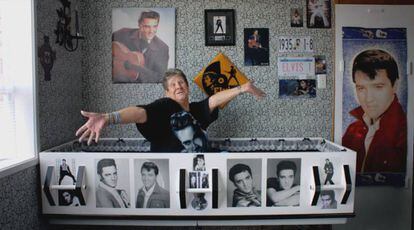The Kiwi Coffin Club: it’s their funeral
New Zealand oldsters and their home-made themed coffins feature in an irreverent music video


Raewynne Latemore’s coffin is papered with photos of her hero, Elvis Presley. Pearl, who owns a chicken farm, painted hers with fowls. Edda, a former can-can dancer, lined hers with satin and sequins.
These three seniors belong to The Kiwi Coffin Club, an association in New Zealand whose 50 members have been making and decorating their own coffins since 2010 to better represent who they were in life at their funerals.
The group – which has inspired dozens of other funeral clubs in the country – has now produced its own documentary, called The Coffin Club. “What is the point of living a life that’s colorful and bold and then you’re told, this is how your exit’s going to be… Boring!” sings Jean, who’s in her nineties, surrounded by dancing grandmothers decked out in gold lame.
If they die tomorrow, they will go like stars Katie Williams, Coffin Club founder
“Death is such a taboo subject that even people who have lived full lives lose control of their final decisions,” explains Katie Williams via email from Rotorua, a small town in northern New Zealand. The 78-year-old founder of the club was a nurse who saw many people given impersonal and standardized burials that did not represent the deceased’s wishes. She started the club in her own garage. “I never imagined the enormous interest this would generate,” she confesses.
Part of the motive behind setting up the club was to save money. A self-made coffin “rarely exceeds NZ$500 [€300] and that’s the most expensive,” says Williams. A conventional casket can cost up to 10 times more. “We’ve encouraged manufacturers and some funeral homes to start offering cheaper options,” says Williams, who has also organized do-it-yourself cremations, which are legal in New Zealand.
The Coffin Club from Loading Docs on Vimeo.
The Rotorua club meets every Wednesday from 8am to 1pm. “Socializing is an important part of it,” says its founder: “We are all partners who attend for the company. Many older people live alone and do not get the affection they need. Here we share kisses and hugs and if someone does not show up, we check to see if they are okay.” Most members finished building their coffins some time ago, so now they simply share a cup of tea, help each other, talk about death, laugh, and create relationships.
Some Coffin Club members who have already finished their box are using it as furniture at home until the time comes to be laid out in it. Some members have used it as a base for a sofa bed; others as a trunk for bedding.
During the last seven years some of the club’s members have died, “but it’s wonderful that they had control over their own end,” says Williams. “Death, just like birth, should be a celebration.” Her festive message inspired filmmaker Briar March to direct the musical, featuring the club’s members. “If they die tomorrow, they will go like stars,” says Williams.
English version by Debora Almeida.










































